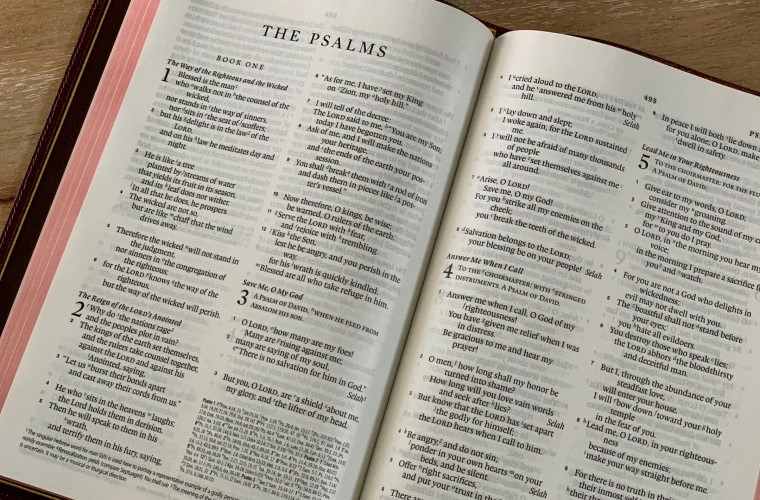One unique aspect of studying the Psalms is the self-contained nature of each psalm. After all, the different psalms were composed by different people on different occasions and only later assembled into a collection of worship songs for Israel (the collection covers approximately 1410-450 BC). Each psalm is an independent work, so it’s like the Psalms are a mini book collection within the greater book collection we know as the Bible. Therefore, while other books of the Bible require special attention to the preceding and proceeding context of each chapter to understand the author’s main point, you do not need to pay attention to the before and after context of each psalm to understand and appreciate the meaning. Or do you?
Clues of Order
While it’s true that the psalms are largely self-contained works, their order in the book of Psalms is not random. There are actually signs of purposeful arrangement throughout the Psalms: the Psalms are divided into five books, with each book ending with a doxology (Ps 41:13; 72:18-20; 89:52; 106:48; 150:6); there are labeled groups of psalms at different places in the book (e.g. The Songs of Ascents, Ps 120-134; the Psalms of Asaph, Ps 73-83); and there are also some psalms that clearly connect together in subject matter (e.g., the Messianic psalms of Psalms 22-24 or the psalm pairs connecting God’s word and God’s Messiah, Ps 1-2; 18-19; 118-119). In fact, there appears to be a general progression of subject matter over the course of the Psalms, as I outline below.
A Proposed Order
Of course, once one recognizes a purposeful arrangement, the question raised is “Why?” Why five books? Why this particular arrangement and not a different one? The answer in specific cases is not always clear, but Bible teachers have suggested a couple of answers for the general order of the Psalms at least:
1. The five books of the Psalms reflect the five books of another key part of the Bible: the Torah. Just as Israelites were to devote themselves to the law of Moses, so they were to devote themselves to this “second Torah” in their pursuit of God.
2. The five books of the Psalms correspond generally to the experience of Israel and its Davidic king. To borrow my seminary professor’s labels for each book:
- Confrontation: Book 1 (Psalms 1-41) features many psalms of struggle written by David and reflects the conflict Israel experienced as David established his divinely ordained rule.
- Communication: Book 2 (Psalms 42-72) features psalms involving nations outside of Israel, reflecting David’s victory over his enemies and Israel’s expanded influence toward the nations. The international name for God, “Elohim,” is used much more frequently than “Yahweh” in this book.
- Devastation: Book 3 (Psalms 73-89) reflects Israel’s devastation by foreign nations and the Davidic king’s crown cast into the dust. All of the exilic psalms poignantly appear in this book.
- Maturation: Book 4 (Psalms 90-106) reflects a matured Israel returned from exile, with many psalms affirming God’s sovereign rule and the future establishment of God’s kingdom.
- Consummation: Book 5 (Psalms 107-150) features many psalms of praise and eschatological blessing. This book reflects the climax of redemptive history: the joyful establishment of the kingdom of God on earth and the accomplished redemption of Israel.
Conclusion
Recognizing this general arrangement of the Psalms does not greatly affect the interpretation of any particular psalm but does deepen your understanding and help you appreciate specifically how the Psalms reflect both the history and future of the people of God. For example, Psalm 24, the psalm we examined together last Sunday, fits within the general section of Confrontation related to David’s kingship. But just as Yahweh once subdued David’s enemies and entered Jerusalem as a conquering king, so the Davidic King to come will also battle the nations in the power of Yahweh and march victoriously into Jerusalem.
But who will enter in with the king of glory on that future day and dwell in his presence? The same kind of person originally outlined in David’s day. May we be counted as such people!
Psalm 24:3-5,
Who may ascend into the hill of the Lord?
And who may stand in His holy place?
He who has clean hands and a pure heart,
Who has not lifted up his soul to falsehood
And has not sworn deceitfully.
He shall receive a blessing from the Lord
And righteousness from the God of his salvation.
Questions to Consider:
1. Why does the book of Psalms begin with Psalms 1 and 2?
2. There is still some variety within each book of the Psalms. What might be the purpose behind this variety?
3. Have you ever considered both the historical and eschatological nature of many psalms? How might this change the way you understand and pray the psalms?

